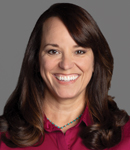For our final Powherful Forces column of 2022, we are pleased to introduce Claire Gotham, VP, Utilities for Capgemini.
When Claire Gotham first began working in the electric energy sector in the 1990s, it was a very different industry than it is today. Other than new regulations, an increase in climate change awareness and a growing acceptance of solar power as an alternate energy source, there were few significant changes within the power industry’s first 100 years As Gotham pointed out, “It used to be an industry, where literally, you put the product into the pipe and pushed it out, where it went was transferred through transmission wire to the consumer (we called them rate-payers), and that’s what the customer got.”
Describing how she found her way into the utility space as a circuitous path, Gotham explained, “My very first job was for a small introducing broker in Atlanta, where we primarily served commercial hedgers. While I was there, I studied for and passed my Series 3 Exam to become a derivatives trader. That was a great entry into the financial and risk side of the power industry. And then, the focus of electricity shifted for me when I got my first job with a utility.”
Within a few years, Gotham became a product manager for the largest investor-owned utility on the West Coast. The timing was interesting because once she began working directly for the utility, she saw that the industry was beginning to change.
“For decades, [industry professionals] did not innovate,” said Gotham. “They weren’t rewarded for innovating. They focused on maintaining a stable grid and providing customer service. Stability maintenance and providing service remain important, but the industry has shifted.
“[Utilities] have to be more innovative now because there is more competition. Today, there are third-party retail providers in the mix. There are also companies that no one would think of as traditional energy providers, and some tech companies or companies that manufacture electric vehicles have signed power purchase agreements (PPAs) with utility companies.”
According to Gotham, utilities are taking note of the competition. “Many utilities are doing an excellent job of looking outside of their theoretical walls,” said Gotham. “They’re looking for new ideas and shifting and looking to diversify their portfolio of generation. And those that are struggling will have to catch up.”
One thing that has not changed since she first launched her career is Gotham’s appreciation for the role mentors have played. According to Gotham, mentorship – whether formal or informal – is crucial to a person’s personal and professional growth, and she still applies the wisdom of those who mentored her along the way.
Among the mentors, whose style influenced her early, on was a woman named Maria Eansor. Eansor was interested in her employees’ producing quality work, but she was even more concerned with them as people and took a holistic approach by discussing with them their goals, professional and personal development and their well-being.
Gotham said she always will be grateful for the lessons and management style she learned from Eansor, but it is the advice of her mentor Rosalie Roth, that continues to resonate with her to this day. Gotham had never met Roth, but because Roth was a female executive in a male-dominated industry, someone suggested Gotham reach out to her. Today, Gotham still applies one of the most compelling pieces of advice she received from Roth, who told her that she needed to find a mentor and also be a mentor. "You need to find a Doc Brown, and you need to be somebody else's Doc Brown," Roth advised Gotham.
For those who may not understand the reference, Doc Brown was the eccentric inventor and time traveler in the movie, ‘Back to the Future.’ At the end of the film, Brown – who has been a mentor to the film’s protagonist, Marty McFly – returns from the future to give the young McFly guidance on what his older self has in store.
As a female executive in an industry that is made up mostly of men, Gotham is particularly committed to being a Doc Brown to women. “What your mentors tell you may not always be accurate, and what you tell mentees may not be correct all the time, but it’s helpful to have someone who’s ‘been there, done that,’ and can point out signposts to watch for, and I think it’s important to send extend that arm back to other women in the industry.”
For those just embarking on their careers, or individuals looking to change their profession, Gotham cites Misty Copeland with the American Ballet, who said, “Know that you can start late, look different, be uncertain, and still succeed.”
“I love that quote from Copeland because young people today are forced to choose and decide so soon – too soon – what their professional path is,” said Gotham. “For example, they have to declare a major when they’re applying to schools before they’ve even taken a college class. I was lucky enough to be able to take a number of random classes and taste the ‘academic buffet’ and decide – and at that point, I still didn’t know what I wanted to do professionally, so I chose to study what I enjoyed and got hands-on experience when I graduated.”
Gotham encourages people to keep an open mind about making significant changes – regardless of a person’s age or stage of career. “Don’t close any doors prematurely. You don’t know what’s on the other side. Those doors lead to different types of people, and it never hurts to have more connections with more folks – not from the standpoint that maybe they do something for you, but rather, maybe you can learn something from them, or they can learn something from you. Maybe they’ll spark an idea, or tell you about a part of the industry you didn’t even know about or hadn’t considered.”
Gotham stepped into her career as a derivatives trainer in an industry once considered relatively stagnant, but her lifelong belief in mentorship and advice to remain open to whatever the future holds is validation that as both an employee and executive, her approach has worked. Changes may have been a long time coming to the electric energy sector, but today, Gotham has established herself as a leader in an industry that both encourages and celebrates innovation – or, as she put it, “I have watched this industry (specifically, utilities) go from being like a massive aircraft carrier turning in the ocean, to one that is moving forward with a bit more ease, like a speed boat.”
 Claire Gotham is a vice president in Capgemini Americas’ Energy, Utilities and Chemicals business unit, focused on power, utilities and renewables. She is a leader in retail and wholesale energy, trading and risk management and digital transformation. In her role, Gotham draws upon over 25 years of experience in consulting and business development, tackling complex projects, leading diverse teams of project staff, technology specialists and consultants and advising C-level executives, boards of directors and PMO boards to deliver excellent results. Gotham’s deep experience working with various public and private companies makes her a unique leader in the energy industry.
Claire Gotham is a vice president in Capgemini Americas’ Energy, Utilities and Chemicals business unit, focused on power, utilities and renewables. She is a leader in retail and wholesale energy, trading and risk management and digital transformation. In her role, Gotham draws upon over 25 years of experience in consulting and business development, tackling complex projects, leading diverse teams of project staff, technology specialists and consultants and advising C-level executives, boards of directors and PMO boards to deliver excellent results. Gotham’s deep experience working with various public and private companies makes her a unique leader in the energy industry.







